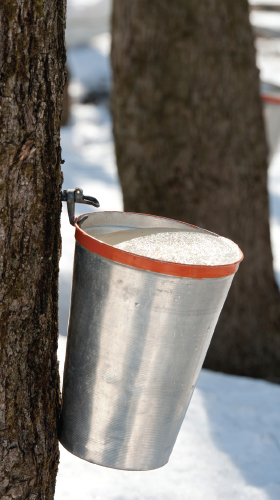The sweet truth about maple syrup
by Jérôme Rigot, PhD
This article was originally published in October 2015

Many people may wonder why a seemingly natural product such as maple syrup would need to be certified organic. There are significant differences between conventional and certified organic maple syrup production.
One key difference is that the maple stand (or sugar bush) must be managed for long-term health and sustainability. Under organic standards, good forestry practices are required to ensure a healthy and diverse stand composed of mixed young and mature maple species with at least 15 percent of different tree species.
Organic producers are expected to follow practices that will minimize impacts to the forest and the trees. Tubing and pipelines that carry the sap to the sugarhouse must be secured so as to not damage trees. Nails and other hardware inserted into trees to hold lines are prohibited, and paint (a synthetic substance) cannot be used to mark trees. The chemicals used to clean or disinfect the lines must follow organic regulations avoiding toxic products.
Organic vs. state regulations
Organic standards protect tree health by preventing over-tapping. Some states regulate domestic maple syrup production, but state regulations often differ from organic regulations. States may allow tapping trees with smaller diameters than required by organic regulations and the number of taps allowed per tree can be significantly different. Note that a tree with a smaller diameter is a younger tree that will be more stressed by the tapping than a more mature tree.
Small taps (5/16″) are used in organic production, while taps up to 7/16″ in diameter may be allowed by state regulations in conventional maple syrup production. A larger bore is likely to generate more damage to the trees and holes that will heal much more slowly.
Organic: no chemicals, lead
In organic production, no synthetic chemicals can be applied in the sugar bush. Conventional producers often use herbicides or other synthetic pesticides to control unwanted plants or insects and also may apply synthetic fertilizers.
Lead is also a big concern. Old galvanized containers that were used to collect sap directly from trees or the galvanized tanks used to store sap would leach significant amounts of lead into the sap. In organic production, all tanks are stainless or food grade plastic and evaporator pans are stainless steel. The drums used to pack the finished syrup are stainless or food grade plastic. If galvanized, they must be inside-coated with epoxy and regularly inspected for flaking of the epoxy paint. Drums with flaking epoxy paint are discarded.
The organic sugarhouse must be clean. All equipment, such as the reverse osmosis unit, the filter press, holding tanks and the evaporator pans must be in good condition and thoroughly cleaned every day throughout the season. Only certain cleaning chemicals for the pans and the reverse osmosis unit are permitted in organic production and the rinsing must be extensive, as noted in the required protocols.
During the sap boiling process, conventional syrup producers often add synthetic defoaming agents that contain additives such as mono- and di-glycerides as well as polyethylene glycol. Organic producers must use certified organic vegetable oils or organic butter. Remember that the sap is greatly concentrated (approximately 40 gallons of sap creates one gallon of maple syrup) so anything added, or any contaminants, will be significantly concentrated as well.
The organic inspector checks that all organic standards are being followed and the records (required in organic production) are up-to-date during an annual inspection of both the sugar bush and the sugarhouse.
The takeaway: Certified organic maple syrup is healthier for you, the maple trees and the environment.
This story was first published in the summer 2015 Cultivator, The Cornucopia Institute’s quarterly newsletter.
